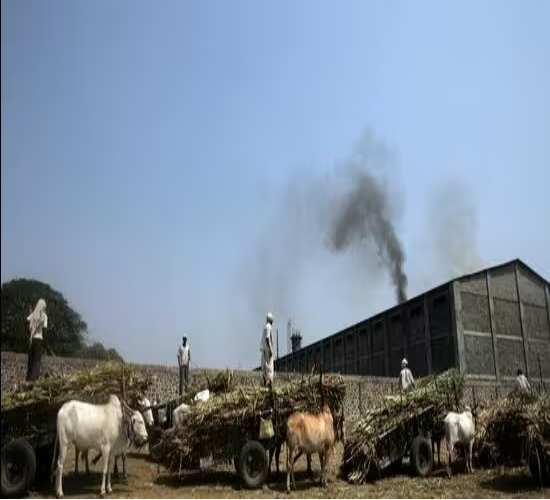Which Pawar will capture the cooperative sector?

MUMBAI: With the Election Commission of India’s decision to hand over the NCP name and symbol to the Ajit Pawar faction, Ajit’s influence in the party’s core base—the cooperative sector—is bound to increase. However, Sharad Pawar, with his formidable image in this sector, his access to the various rival groups working in it and his micromanagement skills, will remain a player to be reckoned with, said experts.
When the NCP was formed in 1999, many leaders from western Maharashtra joined the party on account of their stake in the cooperative sector and Sharad Pawar’s control over it through the Maharashtra State Cooperative Bank and various state-level associations. Subsequently, during his 15 years of power as minister and deputy CM, Ajit became the face of the sector. That was the reason that many NCP MLAs—apart from the threat they faced from central agencies—chose to go with Ajit, who they believed would protect their interests.
In the realm of Maharashtra’s politics, the cooperation department holds significant sway, given its direct oversight of 2.5 lakh cooperative societies that wield considerable influence over both the rural and urban economy. Cooperative banks, for instance, are crucial for politicians, as they play an important role in funding various businesses, including cooperative sugar mills and other industries controlled by them. In Maharashtra, control of the cooperative framework has always meant a consolidation of political, economic and social power. The stronger the grip over cooperative banks, sugar mills and credit societies, the greater the opportunity to sway voters, who are also shareholders in these institutions.
Little wonder then that one of the first key decisions that Ajit forced his new allies to take was a reversal of a May 2023 amendment in the Maharashtra Cooperatives Act which allowed only active members to vote during elections to a cooperative body. This was in August 2023, barely a month after he and his eight MLAs joined the BJP-Shiv Sena government.
Back in 2019, when many NCP leaders from western and North Maharashtra switched their loyalties to the BJP, the Sharad Pawar-led party suffered a dent in the cooperative sector, which it had controlled for decades to retain its hold in politics. After five years, when the Pawar NCP has been taken over by his rebel nephew, the latter has almost completely usurped whatever limited clout that the party had in the sector. Of the undivided NCP’s 53 MLAs, only 11 supported Sharad Pawar, and among these, only five—Jayant Patil, Prajkta Tanpure, Balasaheb Patil, Rajesh Tope and Rohit Pawar—have a hold over the cooperative sector in their area through sugar factories, dairies, banks and so on.
Ajit’s men now dominate the sector. The politically important cooperation department has gone to Dilip Walse Patil, an erstwhile Pawar protégé, who shifted loyalties to Ajit. Walse Patil controls the Bhimashankar cooperative sugar mills in Manchar-Ambegaon, which is a home ground of the Pawars. The financially influential Pune District Cooperative Milk Producers Federation and the District Central Cooperative Bank here have been the stronghold of Ajit, who also controls a couple of sugar mills in Baramati region.
In neighbouring Khed tehsil, MLA Dilip Mohite Patil, one of Ajit’s loyalists, is another cooperative baron who chairs the Maharashtra State Federation of Market Committees. In Kolhapur, the district cooperative bank has been under control of Hasan Mushrif, another leader who preferred to go with Ajit.
In Ahmednagar, considered the Mecca of the cooperative sector on account of having the maximum number of sugar mills, the sector is largely controlled by Radhakrishna Vikhe Patil and his family on the one hand and Balasaheb Thorat of the Congress on the other. India’s first cooperative sugar mill was founded in Pravaranagar by Vitthalrao Vikhe Patil. His grandson Radhakrishna Vikhe Patil, a senior BJP leader and revenue minister in the state cabinet, currently controls the Pravaranagar cooperatives. The financially strong Ahmednagar District Cooperative Bank, which was till recently in the grip of the Vikhe Patils, is now with Balasaheb Thorat, as power changed hands during the elections last year.
In neighbouring Nashik, the Bhujbals have a grip over the sector that is largely driven by sugar and grapes. Armstrong Infrastructure Pvt Ltd, a sugar firm here, is controlled by Bhujbal’s son and nephew Pankaj and Sameer, while the cash-strapped Nashik District Central Cooperative Bank is under the control of an administrator. The Bhujbals are currently with Ajit’s NCP.
In Satara, the district central cooperative bank is controlled by BJP and NCP (Ajit Pawar) leaders. In neighbouring Sangli too, the district bank is under the control of BJP leaders while the cooperative sugar mills are divided between politicians from different parties, including Jayant Patil of the NCP (Sharad Pawar camp), Vishwajit Kadam of the Congress and BJP MP Sanjay Kaka Patil.
Vasant Bhosale, senior journalist and cooperative sector analyst pointed out that being in the government, Ajit Pawar’s influence in the cooperative sector would get a boost. “Office-bearers like chairpersons, directors of cooperative sugar factories, banks and dairies will largely support him due to his power,” he said. “At the same time, it would be wrong to underestimate Sharad Pawar’s power in the cooperative sector.”
Bhosale pointed out that in the last four decades, Pawar had developed new leadership in the state, that too by encouraging new leaders to fight against the established ones. “The cooperative sector structure is very complex due to the different political inclinations of office-bearers,” he said. “Also, rivals who want to take control provide a political opportunity for parties and big leaders to get a new base in that area. Pawar, due to his five-decade-old influence in the sector, and personal style of helping different groups, has access to them all, and with his micromanagement skills, is likely to find new faces to fight against the established leaders.”
Bhosale added that Pawar might get negligible success in the Lok Sabha elections with its multifarious issues but in the assembly elections, where the cooperative sector played a significant role, he was likely to dent the influence of many leaders in their areas.
A former chairperson of a cooperative bank in western Maharashtra pointed out that Ajit Pawar’s influence would inevitably increase after the ECI verdict. “But at the same time, there is a panel system in this sector and every board of directors consists of people from various political parties,” he said. “They unite to control that particular cooperative organisation but at the same time work separately in the Lok Sabha and assembly elections. Sharad Pawar has the image of being a troubleshooter in the cooperative sector with his knowledge and understanding of different sectors like sugar, ethanol, banking and dairy, and also has decades-long relationships here. So, though Ajit will be the bigger player in terms of sugar factories or district banks controlled by his MLAs and MPs, this does not mean that the common man connected with those all cooperatives will go with him. Sharad Pawar will not be finished as far as clout in this sector is concerned.”
Source Link: https://www.hindustantimes.com/cities/mumbai-news/which-pawar-will-capture-the-cooperative-sector-101707332726693.html
















